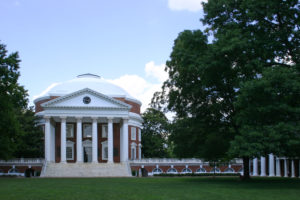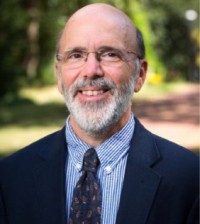First Loves, Last Loves: Jefferson, Monticello, and UVA
Written by John Ragosta, Summer Jefferson Symposium Faculty Leader and historian at the Robert H. Smith International Center for Jefferson Studies at Monticello
Everyone has a first love: wildly impassioned, sometimes reckless, undoubtedly wrapped in dreams of a long life together.
But what of last loves? More mature; a deep, abiding warmth for heat; perhaps formed at a point when life has already been full of much adventure, trials and tribulations, joys and success.
Perhaps that is a better way to think of Thomas Jefferson’s deep passion and commitment to the University of Virginia and the Monticello that he rebuilt (and continued to rebuild) when he retired after his presidency. These “last legacies,” certainly lasting legacies, will form the framework for our discussions at this year’s Summer Jefferson Symposium at UVA and Monticello.
Last week, a colleague’s thoughts and questions got me reflecting on Jefferson’s motivations in his retirement years.
One theme that has captured my thinking about Jefferson this past year or two is his focus on, and commitment to, generational change, a topic explored brilliantly in Peter Onuf’s and Annette Gordon-Reed’s The Most Blessed of the Patriarchs. The idea that each generation controls its destiny and the world in which it lives was really foundational to Jefferson. “[T]he earth belongs to the living,” a phrase that he repeated at various times and circumstances to a broad group of correspondents, was not a trite aphorism. This principle had applications for Jefferson in so many ways. Certainly it was a shibboleth against what Jefferson saw as the dead hand of the past in religion, education, or government. It explained one of the great problems with a large national debt and why “tradition” was not an adequate defense of an unsound policy. In fact, Jefferson sometimes took the idea to extremes, suggesting to James Madison that all laws and constitutions should only last a generation (until the more careful Madison reasoned him back from that precipice).

In later life, the maxim could also serve as a shield for Jefferson when he did not wish to engage forcefully with a difficult topic. For example, he saw the elimination of slavery as something that was inevitable and to be desired but, conveniently, after he retired this necessary and great work was the responsibility of the “younger generation.”
How, then, does this fixation on generations and control of the world by the young generation explain his devoted focus on Monticello and UVA in his later years?
Perhaps it is easier to see in the context of Monticello. This was his home, his family, his daily community, and it was arranged for his comfort, a retreat from the world (although the world kept breaking in). Jefferson was honestly distressed when it became clear that the next generation would face difficulties from his debts. He attempted to restrict his spending, but the debts were too great and the result was inevitable.
What, though, of UVA?
For a man who insisted that his time was done, that the next generation controlled the earth, but a man who was restless and vigorous, there was no project better to absorb his time and interest than the education of youth. Here was the hope of future generations, and here was his chance to continue to influence, not actively – through legislation, government, business, or finance – but perhaps even more effectively through education of that next generation. As my friend suggested, in one sense, this might also have been his chance to redeem himself for all of the hopes and dreams of his life that had not quite worked or come to fruition. Perhaps, even, here, in education and Enlightened reasoning, was the hope for slavery. All of his hopes for the future were building materials as he laid-out his “academical village.”
When the students rioted in the first year of the University, it cut Jefferson deeply. It was more than a personal affront, or some young people behaving badly, it meant that his hope for the new generation (his hope to succeed where he had failed) was at risk. Students, in their passions (and first loves), may make mistakes, but Jefferson was well-aware that they were the future and that the future required that they receive a liberal education. That is why UVA was so important.
Those of us who participate in education can, perhaps, more easily understand that. Returning to academia later in life, it is something that speaks loudly to me: While I achieved much in my professional life, nothing can compare to my hope that I can contribute to the future generation and its remarkable journey as it takes possession, in usufruct, to use Jefferson’s term, of the earth.
First loves are scintillating, fiery, and wonderful. Last loves, though, may be deeper, stronger, and with a different type of hope.
Jefferson certainly loved Monticello and UVA; the one was his home, with all the rich meaning that that entailed; the other was his hope for the nation which he had helped to create.
- A Revolution in the Air: The Wright Brothers Take to the Sky on December 17, 1903
- Musings on National Violin Day
- Making the Promise Real: How a UN Tax Convention Can Fulfill the UNDHR’s Vision
- UVA Club of Atlanta: Virtual Pilates Class
- UVA Club of Vietnam: J-Term Farewell Social
- UVA Club of Atlanta: UVA Women's Basketball at Georgia Tech
